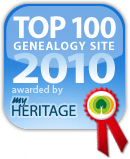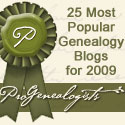In the month of December there was a considerable amount of discussion on the APG (Association of Professional Genealogists) mailing list about “occupational closure” and “true profession.”  I have to admit that I had to conduct considerable research to understand those two unfamiliar terms, apparently understood by sociologists, but not by me.
Wikipedia defines occupational closure as:
…the sociological term given to the process whereby a trade or occupation transforms itself into a true profession by closing off entry to the profession to all but those suitably qualified.
Consequently, one may define true profession as:
A trade or occupation that is restricted to those who are suitably qualified.
The Wikipedia article on occupational closure further states that:
(Occupational closure) .. . can be achieved by licensure, through barring entry to all except those who have passed certain entrance examinations and grades of training, or by allowing entry only to those who have gained membership of a specific professional body.
In reality, all three methods of occupational closure are used in the true professions such as law and medicine . However, without licensure (or some other governmental regulation), the only achievable goal is that of a semi profession (a profession that does not meet all the requirements of a true profession).
Let me invent a fictional organization that oversees the entire genealogy profession and call it GARP (Genealogists Are Real Professionals) . Let’s say that GARP decided to establish a tiered membership structure with three levels: 1) full members who have demonstrated their competency in genealogy through a combination of formal training, certification or accreditation, examination, and experience, 2)Â transitional members who have not yet demonstrated the competencies required for full membership, but whose intent is to achieve full membership, and 3) associate members who are basically hobbyists whose goal is to apply the principles of professional genealogy in their own research.
Potential clients who come across the GARP website would immediately be able to discern who, in the eyes of GARP, were best qualified to conduct genealogical research on their behalf (full members) and those who were not (transitional members and associate members) . Yet, without governmental regulation, there would be no requirement to be a member of GARP in order to seek employment as a professional genealogist and anyone, regardless of his or her qualifications, could still advertise their services through any means at his or her disposal.
Restrictions on who could practice genealogical research for hire would likely require licensure, licensure would require regulation by a governmental authority, and regulation would require legislation by state or national government . However, efforts to successfully pass such legislation would probably require evidence that licensure was required in order to protect the public health or safety .  Personally, I have not seen evidence that unlicensed professional genealogists are a threat to public health or safety.
The primary way to limit entry to the profession to those who are suitably qualified is through licensing . Without licensing, genealogy will not likely achieve occupational closure . Without occupational closure, genealogy cannot meet the sociological definition of a true profession . I have rarely heard anyone even mention licensing professional genealogists and I suspect that any effort to require licensing of professional genealogists would attract little support from the community.
The 11th edition of the Merriam Webster Online Dictionary defines profession as (among other things) “a principal calling, vocation, or employment” and “the whole body of persons engaged in a calling”, definitions easily understood by the general public . The term “true profession” is understood in sociology circles, but it is not well understood among the general population where it is most likely to be understood as the counterpart of “pretend profession” or “hobby” rather than by its sociological definition as a profession with occupational closure . Indeed, if I stood up at the annual meeting of the American Chemical Society, the world’s largest scientific society, and told the members that chemistry was not a true profession, I’d probably sit down to find a capsule of cyanide in my tea.
In the end, I think that discussions of “occupational closure” and “true profession” are rather pointless in the field of genealogy . With that, I offer all of you my best regards and wishes for a Happy New Year!
And, by the way, if you’d like to become a Charter Member of GARP, just send me a clean, unmarked twenty dollar bill in a plain brown envelope.
Copyright © 2011 by Stephen J. Danko




Brilliant, Steve! Great piece of writing. Leave it to the scientific mind to break down the topic to its simplest parts, analyze each of those, and conclude with logic. It cuts through all the emotion and drama exhibited elsewhere and makes it seem like so much babble. You made your point very well. Bravo! And thanks.
Just to clarify (lest anyone believe that “occupational closure” is a goal of the APG), only a handful of APG members (lying on the fringe of the organization) have ever discussed “occupational closure” or making genealogy a “true profession.” To the contrary, the APG operates as an “umbrella” organization, encompassing not only those who conduct research for clients on a full-time basis, but also those who conduct research for clients part-time or not at all, genealogical speakers, authors, genealogy librarians, as well as those who may not do any of these (or other) genealogical activities professionally (read “for hire, for pay”).
I am not speaking for the organization here, but only for myself. However, I am on the APG Board of Directors. Like you, I cannot imagine any situation that would require professional genealogists to be licensed or regulated by the U. S. government. This is quite different from the currently existing certification and accreditation programs in genealogy. In my opinion, BCG and ICAPGen have established systems for testing and recognition of research skills that is sufficient for the needs of the profession.
Again, this is only my opinion, and is not intended to represent the opinions of anyone else in the APG, or of the organization as a whole.
Good morning Michael
Thanks for your comments about GARP. I have read the output from that organization and have received email soliciting my participation. I have stayed out of the way and have no intentions of joining with GARP. One main reason is that I am a one man operation and am not looking for more work.
Again, thanks
Alvie
Yes, Steve, you have captured the essence of the discussion exceptionally well. You may watch for my brown envelope, if you wish, but don’t put off any client work, in the meantime. 😉
Exactly what Jasia said, doubled. Would your registrar accept a few Egyptian bills with “real” Arabic numbers on them? 😉